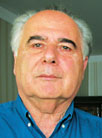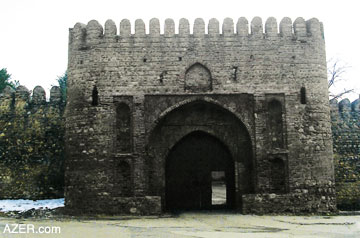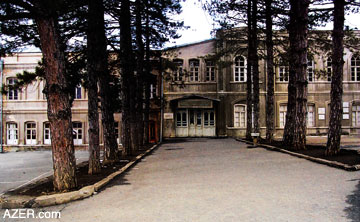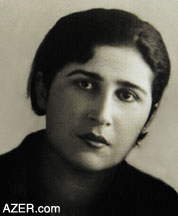|

Autumn 2003 (11.3)
Pages
52-55
Zaza Alexidze. Decipherer
Glimpses
of Childhood
by
Betty Blair
Also spelled Zaza Aleksidze
Related Articles
1 Caucasian
Albanian Alphabet: Ancient Script Discovered in the Ashes
- Zaza Alexidze and Betty Blair
2 Udi Language: Compared
with Ancient Albanian - Alexidze
3 Quick Facts: Caucasian
Albanian Script - Alexidze and Blair
4 Albanian Script: How
Its Secrets Were Revealed? - Alexidze and Blair
5 Caucasian
Albanian Script: Significance of Dechipherment - Alexidze
6 Udins
Today: Ancestors of the Caucasian Albanians - Zurab Konanchev
7 Heyerdahl Intrigued by Rare Caucasus Albanian
Text - Alexidze
  Left: Historian/Decipherer Zaza Alexidze. Left: Historian/Decipherer Zaza Alexidze.
There's no magic in
deciphering an unknown ancient script. Georgian historian Zaza
Alexidze will certainly vouch for that. In Spring 2001, after
working several years on a text that was barely visible which
had been found in a remote monastery in Egypt, the first words
of the Caucasian Albanian written language began to speak to
him.
Perhaps today, those manuscripts would still be waiting to be
deciphered had it not been for Zaza's vast knowledge, cross-disciplinary
studies and his immeasurable patience and persistence. When you
look back over Zaza's life, you see that this journey of discovery
started when he was a young boy. It was his immense love for
books, his knowledge of languages and alphabets - both modern
and ancient, his research into paleography and epigraphy, church
history and traditions of liturgical writing in the region -
all these things taken together that enabled him to crack the
code of this strange alphabet.
Here's a glimpse of Zaza's childhood and the path that prepared
him to dare to undertake the monumental task of deciphering this
unknown ancient script that for more than a thousand years had
disappeared from Azerbaijan.
Ancient Town
Zaza Alexidze was born on August 3, 1935, in Telavi, one of the
most ancient towns in what is now known as the Republic of Georgia.
Townspeople pride themselves that their town, identified as Teleda
was included on one of the maps in Ptolemy's eight-volume Guide
to Geography, written in the 2nd century.
Located about 100 kilometers northeast of Tbilisi, Telavi has
a current population of about 25,000 inhabitants. The town is
the political, economical and cultural center of Kakheti, and
according to Zaza, is one of the richest and most beautiful regions
of Georgia. Centuries earlier, Kakheti had been an independent
principality and, at one time, even a kingdom. "Everything
had a feeling of continuity in time for me when I was growing
up in this small town. Perhaps, that's what first made me so
conscious of history at a very early age," says Zaza.
For example, the school where he studied had had an uninterrupted
history of more than 260 years. The building itself is located
adjacent to the great fortress-like stone walls, which surrounded
an ancient palace where the kings of Kakheti once lived.
  Left: Zaza Alexidze on his first day of school. Early
1940s. Left: Zaza Alexidze on his first day of school. Early
1940s.
Everything about that school was impregnated with history, including
the fact that many prominent political figures, scientists, artists
and writers had studied there. Some of the most illustrious names
who graduated from the same school as Zaza include: Vazha Phavela,
one of Georgia's greatest poets (1861-1915); Academician and
world-famous physiologist Ivane (John) Beritashvili (1884-1965);
and director and reformer of the Georgian theater Sandro (Alexander)
Akhmeteli (1886-1937).
The Alexidzes were three brothers - Thengiz, Zaza and Guram.
Today Thengiz is a geologist, and Guram, following in his father's
footsteps in agricultural science, became a Professor Doctor,
and then was elected as an Academician at the Agricultural Academy
of Georgia.
The family lived in an apartment of only two rooms - the three
kids, their mother, father and grandmother's sister. During the
Soviet era (1920-1991), it wasn't so unusual for so many people
to be crammed into such a small living space in Georgia, nor,
for that matter, any of the other Soviet republics. "Maybe
that's why we developed such close family bonds," says Zaza.
We lived so closely together, confined in such narrow living
quarters.
Influence of Mother
His mother Eugenia played a tremendous role in his life. "There
has never been another person in my whole life with whom I've
had a deeper spiritual and intellectual bond than my mother,"
he admits.
She was a musician - a pianist. She loved Mozart, Beethoven,
Chopin, Schubert and Liszt. The portraits of these composers
adorned the wall next to their grand piano. "I remember
the warm, tranquil autumn evenings in Telavi when she would play
Beethoven's Sonata No. 8 'Pathetique' just for me. I have tried
to foster this same love and knowledge of classical music and
opera in my own children," he says.
But his mom's influence on his cultural development was not limited
to music; she also had an insatiable interest in literature and
had read widely. Zaza credits his mother with the reason he became
familiar with classical literature from early childhood.
  Left: Citadel entrance and fortress walls
in Telavi, the historical town where Zaza grew up. Telavi is
mentioned in 2nd century documents. Left: Citadel entrance and fortress walls
in Telavi, the historical town where Zaza grew up. Telavi is
mentioned in 2nd century documents.
As a child, Zaza loved to sit on the floor, playing with alphabet
blocks, constructing words and short sentences. "I must
have been about three years old when the letters started to take
on meaning for me," Zaza recalls. These blocks were his
first introduction to the puzzles and mysteries of language.
More than 50 years later, he would have the same experience when
he began to work with the barely visible mysterious letters on
a charred manuscript discovered in a remote monastery in Egypt.
His persistence paid off and the Caucasian Albanian language
began to speak to him.
Books became Zaza's greatest joy in childhood. By age four, he
had started to read. It seems he had a special affinity for old
books. The list of books that he had read before he was 10 years
old seems is quite impressive. By the time he was five or six,
he had already read Mark Twain's "The Adventures of Tom
Sawyer" (1876), Harriet Beecher Stowe's "Uncle Tom's
Cabin" (1852) and Jules Verne's "Mysterious Island"
(1875).
One of his most vivid family memories during World War II (1941-1945)
was of him and his brothers sitting around the table at night,
gathering close to their Mother as she leaned close to the lamp
to catch the dim light falling on the pages of the book. As it
was wartime, the windows were blackened so that no light could
be detected from outside. "Mother would read aloud to us
boys," Zaza reflects. "Of course, by then, we were
all quite capable of reading on our own, but we loved those moments
together with her and the lively discussions that followed."
Below: School in Telavi which Zaza attended,
which had a continuous uninterrupted history of 260 years.
  By age
eight, Zaza had read Tolstoy's "War and Peace" (1865-69)
in Russian and a Georgian translation of Cervantes' "Don
Quixote" (1605). "I loved 'Don Quixote' most of all
and memorized much of it," Zaza recalls fondly. "To
this day, it still remains one of my favorites." By age
eight, Zaza had read Tolstoy's "War and Peace" (1865-69)
in Russian and a Georgian translation of Cervantes' "Don
Quixote" (1605). "I loved 'Don Quixote' most of all
and memorized much of it," Zaza recalls fondly. "To
this day, it still remains one of my favorites."
There were days when the future historian balked at going to
school simply because he was so deeply immersed in a book and
didn't want to tear himself away. Fortunately, his Mother didn't
insist. "Even when I was quite young," he recalls,
"Mother always trusted my judgment. That's the way she raised
her children."
This was just about the time that Zaza discovered Shakespeare.
He had borrowed a 19th century deluxe edition of the Complete
Works of Shakespeare from his neighbor. Zaza plunged into reading
all of the tragedies and comedies, the adult versions - not abridged
or children's versions. They were in Russian.
There was one exception - Hamlet. He can't remember exactly why
he had put off reading that specific work. But then one day at
school, he discovered that one of the girls in his class-one
whom he had "his eye on" had already read that drama.
Not to be outdone, he left class and ran home to read Hamlet
that very same day. He was in second grade at the time, not quite
9 years old.
Some of the families of Telavi had remarkable collections of
books in their personal libraries. When the brothers wanted to
read a certain book that they didn't have at home, their Mother
would ask around among friends and neighbors and was almost always
able to find it.
Above: Zaza Alexidze's mother Eugenia had
a tremendous influence on his life, especially in literature
and music. His father Nicolas was one of the first graduates
of the University of Tbilisi.
But there was another library in their town that intrigued Zaza.
During the war, their school had been converted into a military
hospital. Somehow Zaza and his elder brother Thengiz had heard
that somewhere in that building there was quite an extensive
old library. In 1943 when the hospital was transferred to another
location, the boys saw their chance to set out in search of it.
Sure enough, they found their treasure downstairs in the basement.
Stacked up on the floor were piles and piles of books. The boys
were even able to browse through a number of magazines lying
around and even found articles featuring Trotsky (1879-1940)
and Bukharin (1888-1938). At that time, articles featuring such
revolutionaries who had resisted Stalin were absolutely forbidden.
Obviously, no one knew of the existence of these old magazines,
stashed away forgotten in a basement room in a small town far
from Moscow, the center of Soviet bureaucracy.
Zaza remembers being so absorbed in the books that they didn't
budge from that makeshift library until they were made to leave.
Then they gathered up some of those forgotten books and headed
home. One of Zaza's finds was a purely philosophical work: "Atomistic
Philosophy of Democritus in Ancient Greece" written by Georgian
philosopher S. Danelia. He was going on nine at the time. During
the years that followed, at school he started reading intensely
in philosophy, history, logic and psychology, although he had
already determined that he wanted to become a historian.
Surprisingly, as a child, despite his voracious reading habits,
he seldom read past midnight. That's the pattern he has generally
maintained throughout his adult life as well. "Even today,"
he admits, "I rarely work past midnight. I treasure the
nights. Lying in bed is when I do my deepest thinking. That's
the time when so many fragmented pieces of information fall into
place." Zaza admits that nearly all of his own writings
and projects, including the decipherment of the Albanian alphabet,
have been thoroughly deliberated and mulled over in his head
at night - away from his desk, reference books and computers.
"One shouldn't think that the only thing I did in childhood
was read," says Zaza, concerned that someone might get the
wrong impression. "Like any kid, I spent a great deal of
time outside in the fresh air, playing with friends. I was seriously
involved with sports such as soccer, gymnastic and chess and
took part in competitions and whenever possible, I went horseback
riding."
Zaza is quick to admit to a mind - body relationship. "It's
essential for the entire body to be involved if you want to excel
in intellectual pursuits. The physical body must be strong and
well trained, not only the mind," he says.
Though Zaza's father did not directly influence his academic
interests in the profound way that his mother did, Zaza is convinced
that the academic milieu in which he grew up did influence his
own career later on. His father Nicholas was a scientist and
professor, having earned a doctorate in agriculture and specialized
in plant protection.
Nicholas Alexidze was among the first graduates of Tbilisi State
University, an institution that was founded in February 1918
during that brief window of time when Georgia had gained its
independence from the Russian Empire (1918-1921), prior to the
Bolsheviks taking control and imposing the Soviet regime (1921-1991).
Georgia was the first country in the Caucasus to establish a
university. Its founder Ivane (John) Javakhishvili (1876-1940)
is revered as Georgia's finest historian. His indisputable authority
was, and still is, deeply felt in Georgia. Javakhishvili's complete
set of works occupied the most esteemed place on the shelves
of their quite extensive family library although no one had yet
become a historian in the Alexidze family.
From early childhood, Zaza used to pore over these works. Javakhishvili
was primarily concerned with the Caucasus, especially research
related to Georgian and Armenian studies. Zaza believes that
it was Javakhishvili's influence that made him conscious of the
need to approach his studies from an interdisciplinary perspective.
I'm sure all of these factors played upon my subconsciousness,"
admits Zaza. "Even to this day, I'm convinced that genuine
workmanship, in any field, can best be achieved when there is
synthesis of thought between related fields. A cross-disciplinary
approach is absolutely essential: all knowledge is related."
"Over the years," continues Zaza, "I've gradually
arrived at the conclusion that any person who wants to make a
serious contribution 'to sail in deep waters', as we say doesn't
have to be a great specialist in every field related to his own.
However, it's crucial that he acquires a knowledge that is broad
enough so to make him extremely conscious of relationships that
exist between various fields and disciplines."
Zaza suggests that for historians this might mean philology and
linguistics. But, in addition to understanding these broader
relationships, further subdivisions in history might include
paleography, epigraphy, codicology, textology, grammatology and
etymology.
Georgian Church
Despite the fact that neither Zaza nor any of the members of
his family were religious, the church did play a significant
role in those early formative years. In Telavi, their house was
located directly behind the Georgian Orthodox church known as
"Ghvtaeba" (St. Saviour's). This 5-6th century building
doubled as the residence of the Bishop of Alaverdi, who oversaw
the main diocese of Kakheti.
"As a kid, it was only natural that I spent many hours playing
in the churchyard, and had regular contact with the clergy,"
says Zaza. The great religious celebrations fascinated him. Despite
the fact that the Communist Party forbade Party members and Young
Communist Union members (Komsomol) from getting involved with
religion during the Soviet period, the common people, especially
in rural areas were able to gather and worship quite freely,
especially in those early years during and immediately following
World War II. Zaza thinks that these restrictions and contradictions
served to pique his curiosity.
"Enormous crowds would gather in the churchyard and spill
over into our backyard and onto our balcony when the major Christian
celebrations, such as Christmas, Easter, Christ's Ascension and
Transfiguration were commemorated. When the weather was bad,
townsfolk used to come and sit on our balcony and even come inside
our home. So, although I didn't actually participate in those
commemorations and celebrations, I was exposed to things that
not everyone had the chance to see and know," observes Zaza.
Fortunately, during the Soviet period, the atheist government
had not destroyed all the church buildings. In Georgia, many
of the oldest churches (dating back to the 5th century) were
declared historic monuments and were put under the protectorate
of the State.
Academic Work
When it comes to research, Zaza remembers what his first "academic
paper" was entitled, "The Origin of Georgian Script".
At the time, he was about 13 or 14 years old. It was a paper
that he read at a school conference. By that time, he had already
read Javakhishvili's "Georgian Paleography" and "Ancient
Armenian Historical Literature" which provided their own
detailed analyses and perspectives of these issues.
Then he took a fascination in Gremi, the city where his mother's
ancestors had come from. It had been the ancient capital of Kakheti
before Telavi was. Again, Zaza was involved with research that
would relate to future research. His report dealt with inscriptions
that could be found in Gremi in the Georgian, Greek, Armenian
and Persian languages as well as with other historical sources.
Zaza was only 14 years old when Ilia Abuladze's "Paleographic
Album of the Old Georgian Script" was published. The term,
"Old Georgian Script", refers to the early Georgian
alphabet used between the 5th to 11th centuries, which differ
considerably in appearance from the Georgian alphabet that is
in use today.
This is the same script that would be on the top layer of the
palimpsest under which Zaza would discover the Albanian written
script at the Orthodox monastery on Mt. Sinai. Though the Old
Georgian and Modern Georgian languages are relatively close to
each other, their alphabets differ considerably. Years later,
Professor Abuladze who studied the Old Georgian and Armenian
texts would become the founding Director of Tbilisi's Institute
of Manuscripts, and would go on to direct some of Zaza's future
academic there.
Further academic pursuits began when Gabriel Chachanidze, the
Bishop of Alaverdi, visited Zaza's home in Telavi. Zaza remembers
the occasion: "When he saw me holding Abuladze's 'Paleographic
Album', he took a deep interest in me and suggested that we work
together, as he had been a professor of Georgian History at Tbilisi
State University. And, indeed, we spent many hours in his place,
which was located under the dome (cupola) of the church, overlooking
our backyard." Zaza was 14-15 years old at the time.
Almost as forerunner of what was to come, whenever the Bishop
could find time, he and Zaza would pore over photos from those
Old Georgian texts. This was the beginning of Zaza's interest
in epigraphy, paleography, especially in relationship to the
study of alphabets. Of course, even then Zaza knew about the
issues related to the Albanian alphabet.
"It was nigh impossible to know about Georgian and Armenian
alphabets and yet be unaware that the Albanian language had existed,
although no extensive text had ever been found," says Zaza.
In 1937, Ilia Abuladze, had discovered a sample of the Albanian
alphabet in a 15th-century Armenian grammar text, which illustrated
what various alphabets in the region looked like: Armenian, Greek,
Hebrew, Georgian, Syrian, Coptic, Arabic and Albanian. That same
year, Akaki Shanidze identified the Albanian script with the
contemporary Udi language.
More than 60 years would elapse from the time a relationship
had been shown to exist between the Caucasian script and the
contemporary Udi language, and when Zaza would find a sample
of the extended text and identify it as Albanian.
Another person who influenced Zaza during his childhood and high
school years was Givi Machavariani. Though eight years his senior,
Givi became his closest friend and already was a promising scholar
and developing into one of the great linguists of Georgia. Unfortunately,
Givi died rather young, at the age of 40. Nevertheless, the two
managed to publish several works together both in Georgian and
in English. At the time, they were giving serious thought to
developing a program that would combine history, philology and
linguistics into a single united discipline, in an attempt to
search for new ways to study the development of the Georgian
nation.
Givi lived in Tbilisi. During the summer, he would come to the
countryside in Telavi and stay with the Alexidzes, as he was
also a relative. In turn, whenever Zaza went to Tbilisi, he would
spend time with Givi. Zaza credits this friendship with the development
of his interest in linguistics. "At that time, my fascination
with languages became so intense, that it nearly rivaled my desire
to become a historian," admits Zaza. "I'm sure that
had I become a linguist, I would have wanted eventually to focus
on problems related to Georgian ethnogenesis - understanding
the beginnings of the Georgian people."
By that he means studying issues related to the origins of the
Georgian people: whether they were indigenous to the region and
which other nationalities were Georgians related to genetically,
culturally and linguistically?
Zaza didn't become a linguist. But over the course of his studies
and academic pursuits, he ended up having to deal with numerous
languages and alphabet scripts. He is incredibly modest when
it comes to acknowledging his expertise in ancient and modern
languages, noting that there are other scholars who know more
than he does. But his humility reminds one of the Azeri proverbs:
"The tree heavy laden with fruit bends low."
Zaza recalls how his teachers in high school were very keen to
find out which direction he would pursue as a career. When he
finished high school [an 11-year course], each of his humanities
teachers approached him regarding his future academic studies,
hoping that he would choose their own specific field. As Zaza
looks back on those days, he reflects, "Today, I'd like
to think that I have not betrayed a single one of their expectations.
Zaza Alexidze went on to pursue studies in the History and Philology
of the early Middle Ages in the Caucasus at the University of
Tbilisi. He earned his Doctorate (1969) and Post Doctorate (1984)
in Historical Science. He is now Professor at Tbilisi State University
where he heads the Department of Armenian Studies. He is an Academician-Secretary
of the Department of Language and Literature of the Georgian
Academy of Science and directs Tbilisi's Institute of Manuscripts.
In 2001, he succeeded in deciphering the ancient Albanian written
script, the ancestor of contemporary Udi, which is spoken today
by the Udins, who mostly reside in present-day Azerbaijan.
Below is a list of some of the major books he has written that
somehow relate to the decipherment process of the Albanian written
language. Most of these are in the Georgian language.
(1) Materials on the Historical Geography and Place
Names of Georgia. Tbilisi, 1964.
(2) The Book of Epistles, Ancient Armenian Text, Georgian
Translation, Analysis and Commentaries. Tbilisi, 1968.
(3) Ukhtanes: History of Separation of Georgians from
Armenians, Ancient Armenian Text, Georgian Translation, Analysis
and Commentaries. Tbilisi, 1973.
(4) Arseni of Saphara: On The Separation of the Georgia
and Armenia, Ancient Georgian Text, Analysis and Commentaries.
Tbilisi, 1980.
(5) Armenian Inscriptions of Ateni Sioni. Tbilisi, 1978.
(6) Four Inscriptions of Ateni Sioni. Tbilisi, 1983.
(7) Methodological Problems of Analysis of the Georgian
Sources (Hagiography). Tbilisi, 1983.
(8) Georgian Fresco Inscriptions, Vol. I, Tbilisi, 1989.
(9) Breakthrough in the Study of Caucasian Albania, Tbilisi,
1998.
(10) Le Nouveau Manuscrit Georgien Sinaitique No. 50,
Edition en facsimile, Introduction par Z. Aleksidze: Corpus Scriptorum
Christianorum Orietalium, Lovanii, 2001.
(11) Caucasian Albanians Begin to Speak: The Deciphering
and Identification of the Albanian Palimpsest. These publications
in Azerbaijani and Georgian are anticipated in late 2003. Plans
for an English translation are also underway.
Back to Index
AI 11.3 (Autumn 2003)
AI Home
| Search | Magazine
Choice
| Topics
| AI Store | Contact us
Other Web sites
created by Azerbaijan International
AZgallery.org | AZERI.org | HAJIBEYOV.com
|






